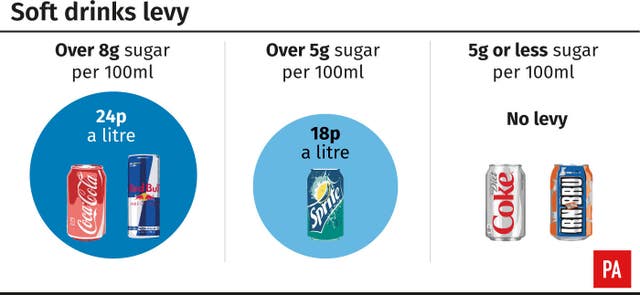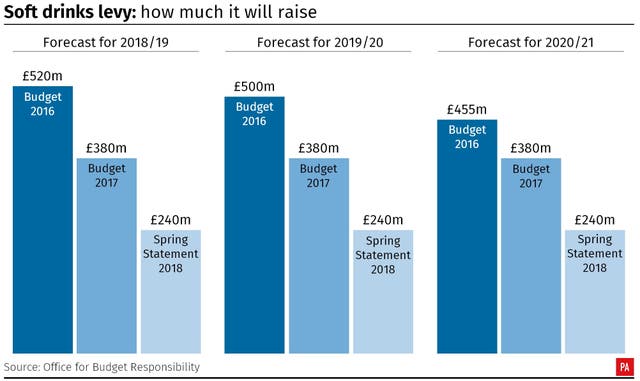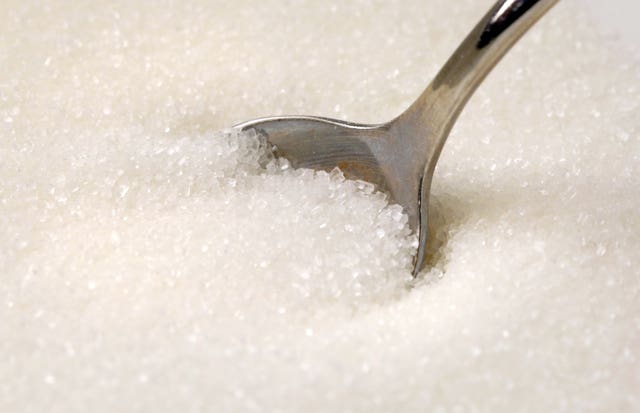
A new tax on sugary soft drinks is now in force across the UK.
Here are the answers to some key questions about the levy and what it means for manufacturers and consumers.
 (PA Graphics)
(PA Graphics)
– What is the sugar tax?
From April 6, soft drinks companies will be required to pay a levy on drinks with added sugar.
– Why are the Government introducing the tax?
The move aims to help tackle childhood obesity. Sugar-sweetened soft drinks are now the single biggest source of dietary sugar for children and teenagers.
It is hoped the tax will encourage drinks companies to cut down on the amount of sugar in drinks, and consumers to choose lower sugar alternatives.
 (PA Graphics)
(PA Graphics)
– How much is the tax?
Companies will have to pay 18p per litre of drink if the product contains more than 5g of sugar per 100 millilitres and 24p per litre if it contains 8g of sugar per 100 millilitres.
Prices of popular drinks may rise and the size of portions shrink as a result.
– Will it apply to all drinks?
The new levy will not be paid on milk-based drinks and fruit juices.
However George Osborne, who unveiled the tax policy as chancellor, has predicted that the tax will be extended to include milkshakes with large quantities of sugar.
 From April 6, soft drinks companies will be required to pay a levy on drinks with added sugar (Philip Toscano/PA)
From April 6, soft drinks companies will be required to pay a levy on drinks with added sugar (Philip Toscano/PA)
– Will the tax work?
The Government has said the tax is already working, with over 50% of manufacturers reducing the sugar content of drinks since the levy was announced in March 2016.
The expected amount of revenue from the tax in the first year has declined from £520m to £240m.
– What products will be affected?
Original Pepsi, Coca-Cola Classic, Red Bull and Sprite are among those which will be affected by the tax, but sugar-free drinks such as Diet Coke and Coca-Cola Zero will be exempt.
– Which brands have reformulated?
Tesco has reformulated all of its own-label soft drinks to come in below the threshold for the levy, as have Morrisons, Asda and The Co-op.
Irn-Bru is one of the big name brands to change its recipe, cutting the sugar in a can from 8.5 teaspoons to four despite a consumer backlash and reports that fans were stockpiling cans and bottles of the original.
Some soft drinks contain too much sugar 👎🏾
The #sugartax will help fight childhood obesity and fund sports 🏀 and breakfast clubs 🍎, helping our kids stay healthy 🙌🏽 https://t.co/LEuHtx5o1l pic.twitter.com/k9tihkZXAo
— HM Treasury (@hmtreasury) April 5, 2018
– What will the proceeds of the tax be used for?
The money will help fund healthy school breakfast clubs and be reinvested in sport in schools.
If revenue from the levy drops, the Government said funding for schools and children will stay the same.
– Is the Government the first in the world to introduce such a tax?
No – other countries have experimented with sugar taxes. Scandinavian countries have imposed similar taxes, as have France and Hungary.
In 2014 Mexico also introduced a sugar tax levy on soft drinks.


Why are you making commenting on The Herald only available to subscribers?
It should have been a safe space for informed debate, somewhere for readers to discuss issues around the biggest stories of the day, but all too often the below the line comments on most websites have become bogged down by off-topic discussions and abuse.
heraldscotland.com is tackling this problem by allowing only subscribers to comment.
We are doing this to improve the experience for our loyal readers and we believe it will reduce the ability of trolls and troublemakers, who occasionally find their way onto our site, to abuse our journalists and readers. We also hope it will help the comments section fulfil its promise as a part of Scotland's conversation with itself.
We are lucky at The Herald. We are read by an informed, educated readership who can add their knowledge and insights to our stories.
That is invaluable.
We are making the subscriber-only change to support our valued readers, who tell us they don't want the site cluttered up with irrelevant comments, untruths and abuse.
In the past, the journalist’s job was to collect and distribute information to the audience. Technology means that readers can shape a discussion. We look forward to hearing from you on heraldscotland.com
Comments & Moderation
Readers’ comments: You are personally liable for the content of any comments you upload to this website, so please act responsibly. We do not pre-moderate or monitor readers’ comments appearing on our websites, but we do post-moderate in response to complaints we receive or otherwise when a potential problem comes to our attention. You can make a complaint by using the ‘report this post’ link . We may then apply our discretion under the user terms to amend or delete comments.
Post moderation is undertaken full-time 9am-6pm on weekdays, and on a part-time basis outwith those hours.
Read the rules here